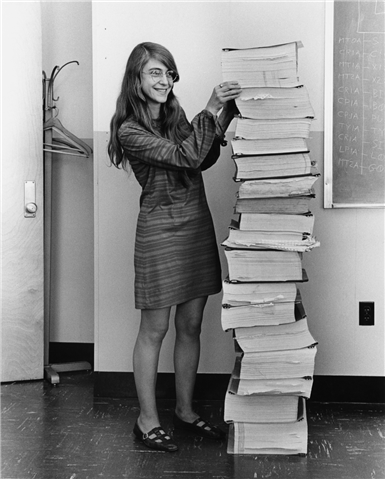Today we celebrate the 87th Birthday of Margaret Hamilton, an American computer scientist and systems engineer, and a driving force behind the Apollo space program's success. Her innovative contributions were instrumental in making the moon landings a reality, revolutionising the way we perceive software engineering and ensuring the success of one of humanity's greatest achievements.
Born on August 17, 1936, in Paoli, Indiana, she exhibited an early fascination with mathematics and science. She attended Hancock High School in Michigan, where her passion for problem-solving and logical thinking began to flourish. Pursuing her academic aspirations, she enrolled at Earlham College, where she earned a bachelor's degree in mathematics.
Her journey led her to the Massachusetts Institute of Technology (MIT), where she continued her studies and started working at the Instrumentation Laboratory (now the Charles Stark Draper Laboratory) in the early 1960s. At this cutting-edge institution, she would find her calling in the emerging field of software engineering.

Her most significant contribution to software engineering came during her work on the Apollo missions. She was the director of the Software Engineering Division of the MIT Instrumentation Laboratory, responsible for developing the onboard flight software for the Apollo spacecraft. Her team's work was particularly critical for the Apollo 11 mission, which successfully landed humans on the moon.
Her concept of "priority scheduling" allowed the onboard computer to manage tasks based on importance, preventing system overloads and enabling real-time decision-making. Her innovations were instrumental in handling the complexities of space travel and ensuring the safe landing and return of the Apollo 11 crew.
The software developed by Hamilton and her team wasn't just responsible for landing on the moon; it also played a crucial role in navigating the spacecraft and making course corrections during the mission. Her contributions demonstrated the significance of software engineering in aerospace applications and set new standards for reliability and precision
Her remarkable achievements did not go unnoticed. She was awarded the Presidential Medal of Freedom by President Barack Obama in 2016 for her pioneering work in software engineering and her pivotal role in the success of the Apollo missions. Her legacy extends beyond the moon landings; she co-founded Hamilton Technologies in 1986, where she continued to contribute to software engineering advancements.
Her impact has extended beyond her technical accomplishments. She has been a vocal advocate for increasing the representation of women in science, technology, engineering, and mathematics (STEM) fields. Her journey has served as an inspiration for aspiring engineers, especially women, demonstrating that determination, creativity, and unwavering commitment can lead to ground-breaking achievements.
Margaret Hamilton's work on the Apollo missions and her role in shaping modern software engineering practices have left an indelible mark on history. Her contributions not only helped humans reach the moon but also pushed the boundaries of what software could achieve. As engineers continue to explore and innovate, Margaret Hamilton's legacy serves as a reminder of the extraordinary impact one person can have on the advancement of human knowledge and capabilities.
Happy Birthday Margaret
Photo by Nicolas Thomas on Unsplash
-

AMK
-
Cancel
-
Vote Up
0
Vote Down
-
-
Sign in to reply
-
More
-
Cancel
Comment-

AMK
-
Cancel
-
Vote Up
0
Vote Down
-
-
Sign in to reply
-
More
-
Cancel
Children